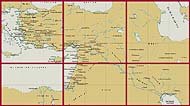Known demographic elements about the Hellenistic world are scarce. Therefore, it is usually not possible to estimate the population of each kingdom. Testimonies by ancient writers often constitute the principal source of such information. For instance, in referring to the population of Egypt, Diodorus Siculus estimated that it numbered some 7,000,000.
More information is available about the composition of the populations in kingdoms, cities and Confederacies. This was characterized by heterogeneity, a fact that contributed to the multiformity of Hellenistic culture. This period is characterized by extensive emigrations of Macedonians and Greeks from southern Greece towards Egypt and the East. These people were drawn to the perspective of career in the administration or in the army and of professional settlement, or to possibilities of profit making in the new territories. At the same time, they constituted a powerful cultural factor in the regions where they settled, decisively contributing to the penetration of Greek culture. There were, therefore, many people of Greek origin in the Hellenistic kingdoms, namely men on active service, mercenaries and army veterans, those who belonged to higher intellectual circles or staffed the administration, as well as merchants. Apart from Greeks, another significant demographic factor in the Hellenistic world were the Jews who had settled in Asia Minor, Greece, Egypt and in Cyrenaica.
People of different nationalities had also settled in the Greek mainland and the islands, as reported by ancient writers and suggested by inscriptional testimonies. A typical example are the Syrians who emigrated to Corinth (Plutarch, Aratus, 18.3), Thessaly and Delos, while in Rhodes the presence of Alexandrians, Antiochenes and Laodiceans is attested. Emigrations of various nationalities to the cities brought about the concentration of an increased number of inhabitants who had no political rights. Thus, in order to solve the problem of their incorporation into the body of the citizens, certain cities -such as Miletus- proceeded to grant political rights to immigrants.
During Hellenistic times, in the kingdom of Egypt, there was an influx of people belonging to various nationalities. For instance, Greeks, Jews, Illyrians, Agrianes, Paeones and Thracians, Bithynians, Mysians, Carians, Cappadocians, Paphlagonians, Armenians from Asia Minor, Syrians, Phoenicians, Arabs, Persians, Libyans and Ethiopians from Africa. In addition, the largest national communities -such as the Egyptians, the Greeks and the Jews- were organized separately and tried to maintain their cultures intact .
| introduction | kingdoms | demography | structures | Greek society |
Note: Click on the small photo to enlarge it.

01. Map showing the cities that were founded